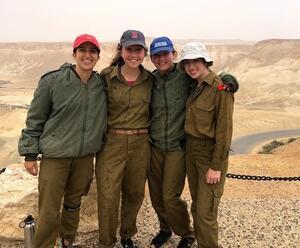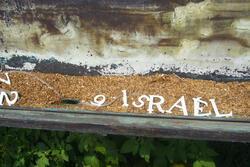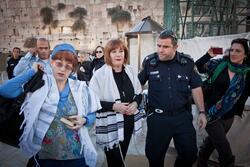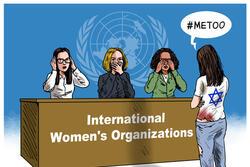Gadna
As our bus bumped over the barren desert road, I nervously looked out the window at symmetrically planted date groves, sparse ramshackle villages, and, as we got closer, miles of barbed wire fence and Lego-like military complexes. I was en route to Gadna, a military simulation run by the Israeli Defense Forces (IDF) for camp groups, gap year programs, and high school semesters abroad, including the one I was on.
I wasn’t particularly excited for Gadna. The militaristic aspect of Israeli society has always been something that makes me feel isolated from the culture. My family is neither Israeli nor military-oriented. Although my maternal grandfather served in the U.S. military after the Second World War, the stories he told me were always more concentrated on the cultural experience of being an American Jew in the immediate aftermath of the Holocaust, with Nazism still lingering in the culture. If anything, my immediate family is wedged into the cushy structure of upper middle class, east coast intellectualism, far removed from military life, and quite happy to remain right there.
Additionally, I was aware that the IDF has been responsible for human rights violations involving the treatment of Arab and Palestinian peoples, most recently through attacks on civilians in Gaza and by aiding the expansion of Jewish settlements in the West Bank. Despite my desire to push myself out of my comfort zone and expose myself to viewpoints different than my own, I fretted about the statement I was making by donning an IDF uniform.
As we pulled up to the army base in Sde Boker, I longingly said goodbye to my normal life, my comfort zone and our beloved bus driver, Omar. I hesitantly stepped off the bus and immediately a female commander (who couldn’t have been more than two years older than me) barked at me: “Hurry up! This isn’t summer camp!”
The next three days were uncomfortable. Not because of the creaky cots, the grimy uniforms, the frozen kosher-for-Passover pre-packaged meals, having to clean the dining hall for three hours, or being yelled at to stand with our backs straight and hands behind our backs; I was ideologically uncomfortable.
I had never been in a situation before where I felt like I was really being indoctrinated. But during those three days in Sde Boker—where I was taught about the benefits of a “national army” instead of a “professional army” and told that IDF soldiers never switch their weapons to automatic, no matter the circumstances—I felt like my classmates and I were tilting our heads back and allowing Kool-Aid to be poured into our open mouths. There was no talk of conflict, of the nuance and contradictions and messiness of the work of the army. Everything was presented as shiny and wholesome. I couldn’t accept that.
It’s not that I don’t think Gadna isn’t important for young Americans to attend, because I know it very much is. Going to Gadna made me appreciate how quickly Israeli teens shift from being normal high schoolers into soldiers tasked with protecting their country. I understand the direness of the task the IDF has at hand. Historically, with no army, there would be no Israel, and thus no Jewish homeland.
Unlike Israeli teens, I took my uniform off after three days and returned to civilian life. Because I don’t politically align with some of the actions of the IDF, I have no plans to enlist. Israelis don’t have the privilege to be able to choose whether to serve or not, or to allow their ideology to shape their citizenship in Israel. A path is already chosen for them.
Of course, Israelis’ views of their state and army are as varied and contradictory as citizens of any free nation’s. However, due to the black-and-white portrayal of the Israeli-Palestinian conflict by the media, many Americans tend to put all Israelis in a box represented by the IDF, Netanyahu, and most recently, Trump. As American Jews, we have to avoid these broad generalizations and internalize the clash between ideological autonomy and national obligation in Israel. It gets harder to do this when President Trump deems non-Zionist Jews “disloyal.”
Gadna helped me realize how lucky I am as an American to have the opportunity to create my own Jewish narrative and establish my relationship with Israel on my terms. Despite Trump’s comments packed with age-old antisemitic tropes, it is essential that American Jews continue to establish their own relationship with Israel, instead of resorting to blind loyalty of any kind. Israel will only ever become the state truly representative of the Jewish people if we challenge it on its shortcomings and demand that it be better.
Former Israeli Prime Minister Golda Meir said, “You don’t have to be a soldier to be a hero.” When considering Israel and the conversation around it in America, I hold this quote close to me. No, I am not willing to fight for Israel with bullets and tanks, but I will strive to understand it in all of its layers of complexity, and to try to help others do the same. I will advocate for a more just Israel.
This article was republished on Fresh Ink for Teens.
This piece was written as part of JWA’s Rising Voices Fellowship.






